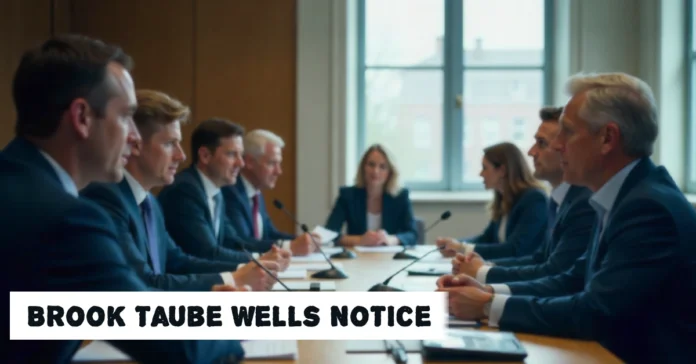A Wells Notice is a formal SEC notification indicating that enforcement staff plans to recommend charges against an individual or company for securities law violations. Brook Taube received one in connection with misrepresenting Medley Management’s assets under management and making misleading growth projections to investors. The case concluded in April 2022 with a $10 million settlement.
When Brook Taube received a Wells Notice from the SEC, it sent shockwaves through the investment community. The co-founder of Medley Management faced serious allegations about misleading investors—a situation that eventually led to a $10 million settlement. If you’re trying to understand what happened or what a Wells Notice means for financial professionals, this guide breaks down everything you need to know.
What Is a Wells Notice?
A Wells Notice represents a critical moment in any SEC investigation. The agency sends this formal letter when its enforcement staff believes they’ve found enough evidence to recommend charges against someone.
Think of it as a warning shot. You’re not charged yet, but the SEC is telling you they’re seriously considering it. The notice gives recipients a chance to respond—typically within 30 days—and explain why enforcement action shouldn’t move forward. This response, called a Wells Submission, lets you present your side before the SEC makes its final decision.
The name comes from John Wells, who chaired the SEC advisory committee that recommended this process in 1972. His goal was simple: give people a fair chance to defend themselves before facing public charges.
Who Is Brook Taube?
Brook Taube built his reputation as a sharp financial mind in alternative asset management. He co-founded Medley Management in 2006 alongside his brother, Seth Taube. The firm focused on middle-market lending and business development companies.
Medley went public in 2014, raising significant capital and managing investments for institutional and retail clients. Brook served as co-CEO, overseeing strategy and growth initiatives. The company managed multiple business development companies (BDCs) and private credit funds.
His career took a sharp turn when regulatory scrutiny intensified. The SEC began investigating Medley’s disclosures in December 2019, eventually leading to Wells Notices for Brook, his brother Seth, and other company affiliates.
The Allegations Against Brook Taube
The SEC’s investigation uncovered serious problems with how Medley presented itself to investors. Starting in August 2016, the company consistently overstated its assets under management in public filings and bond offering materials.
Here’s what went wrong. Medley included “committed capital” from non-discretionary clients in their asset figures. These clients had no obligation to actually invest through Medley, and most weren’t actively doing so. This inflated the numbers and created a false picture of the firm’s size and revenue potential.
The more damaging allegation came from June 2018. Brook and Seth Taube recommended a merger where Medley’s two BDC clients would acquire the parent company. The proxy materials included growth projections that the SEC found had no reasonable basis. Worse, the deal guaranteed the Taubes’ high-paying employment contracts—a clear conflict of interest that wasn’t properly disclosed.
The SEC determined these actions violated antifraud provisions of federal securities laws. Investors relied on misleading information when making decisions about their money.
How the Case Was Resolved
In April 2022, Brook Taube and Medley Management agreed to settle with the SEC. They paid $10 million in combined civil penalties without admitting or denying the allegations.
The settlement included several key provisions. Both Brook and Seth Taube agreed to cease from future violations. They accepted censure on their professional records. The payment structure was unusual—the money would go to Medley LLC bondholders through the company’s bankruptcy proceedings rather than to the SEC directly.
Neither brother faced criminal charges. This was a civil enforcement action focused on regulatory violations rather than criminal fraud. They also weren’t banned from the securities industry, though the censures remain on their records.
The resolution followed a pattern common in SEC cases. Settling avoids lengthy litigation and allows everyone to move forward, even if questions about wrongdoing remain unanswered.
What a Wells Notice Means for Financial Professionals
Receiving a Wells Notice creates immediate challenges for anyone in finance. Your reputation takes a hit the moment word gets out. Clients start asking questions. Business partners get nervous. Even if you’re eventually cleared, the stigma can linger.
The financial costs add up fast. Legal representation isn’t cheap, and building a Wells Submission requires expert help. You’ll need securities lawyers who understand SEC procedures and can craft arguments that resonate with enforcement staff.
Time pressure makes everything worse. You typically have 30 days to respond—not much time to gather evidence, build a defense, and decide on strategy. Some people request extensions, but the clock keeps ticking.
Your professional future hangs in the balance. If the SEC proceeds with charges and wins, you could face fines, industry bans, or disgorgement of profits. Even settlements create permanent marks on your regulatory record that potential employers and investors can see.
Lessons from the Brook Taube Case
The Medley Management case highlights why accurate disclosures matter so much. The SEC doesn’t tolerate inflated metrics or misleading projections, especially when they influence investor decisions. Companies must clearly distinguish between committed capital and actual assets under management.
Conflicts of interest need transparent disclosure. When executives stand to benefit personally from transactions, investors deserve to know the details. The failure to properly disclose the employment contracts in the merger proposal became a central issue in the SEC’s case.
Growth projections must have reasonable foundations. You can’t make optimistic forecasts without supporting data. The June 2018 projections that lacked a reasonable basis violated fundamental principles of securities law.
The financial industry learned a broader lesson, too. Asset managers now scrutinize their public disclosures more carefully. Compliance teams have strengthened internal controls around AUM reporting and merger-related communications.
What Happens After a Wells Notice?
The process doesn’t end when you receive the notice. You face several possible outcomes depending on how you respond and what evidence exists.
Best-case scenario: the SEC drops the matter. This happens when your Wells Submission convinces enforcement staff that they got it wrong or don’t have enough evidence. It’s rare but not impossible.
More commonly, cases end in settlement. Most recipients negotiate terms to avoid litigation. You pay penalties, accept restrictions, and move on without admitting guilt. This saves time and money for everyone involved.
If you refuse to settle and the SEC proceeds, you face formal charges. This leads to either an administrative proceeding before an SEC judge or a federal court case. Both options mean expensive litigation with uncertain outcomes.
The entire process can take months or years. From the initial Wells Notice to final resolution, expect significant time and resources devoted to your defense.
How to Respond to a Wells Notice
Your first call should be to a securities lawyer with SEC experience. Don’t try handling this alone. The technical requirements and strategic considerations demand professional expertise.
Your attorney will help craft a Wells Submission addressing the specific allegations. This document presents legal arguments, factual disputes, and reasons why enforcement isn’t warranted. Quality matters here—a strong submission can change the outcome.
Gather all relevant documents and communications. You’ll need emails, meeting notes, financial records, and anything else that supports your position. Organization makes a huge difference when building your defense.
Consider whether settlement makes sense. Sometimes fighting isn’t worth the cost and risk. Your lawyer can help assess the strength of the SEC’s case and negotiate favorable terms if a settlement seems appropriate.
Stay professional throughout. How you conduct yourself during this process affects your reputation and future opportunities. Even if you disagree with the allegations, maintaining composure serves you better than hostility.
The Broader Impact on Medley Management
The Wells Notices and eventual settlement devastated Medley Management. The company’s reputation suffered irreparable damage. Clients lost confidence and began withdrawing investments.
Financial pressure mounted quickly. Legal costs drained resources while regulatory uncertainty scared away new business. The firm struggled to maintain operations under the weight of investigation and negative publicity.
Medley LLC, the operating affiliate, eventually filed for bankruptcy. The $10 million settlement payment went to bondholders through bankruptcy proceedings rather than straight to the SEC. This unusual arrangement reflected the company’s financial distress.
The business development companies Medley managed faced their own challenges. Some underwent leadership changes. Others merged or were acquired. The entire organizational structure that the Taubes built essentially collapsed.
FAQs
What exactly did Brook Taube do wrong?
Brook Taube and Medley Management misrepresented the company’s assets under management by including committed capital from non-discretionary clients who had no obligation to invest. They also made growth projections without a reasonable basis when recommending a merger that would personally benefit the Taubes through guaranteed employment contracts. These actions violated federal securities laws by misleading investors about the company’s size, prospects, and conflicts of interest.
Does a Wells Notice mean you’re guilty of securities fraud?
No, a Wells Notice means the SEC enforcement staff intends to recommend charges—it’s not a determination of guilt. Recipients can respond with a Wells Submission arguing why charges shouldn’t be filed. Some cases get dropped after review. Others proceed to settlement or litigation. The notice is part of the enforcement process, not a verdict.
Can you still work in finance after receiving a Wells Notice?
Yes, though it creates significant challenges. A Wells Notice itself doesn’t ban you from the industry. However, if the case proceeds and you’re sanctioned, penalties could include industry bars or limitations on future activities. Even without formal restrictions, the reputational damage can make finding employment or clients difficult. Many professionals continue their careers after Wells Notices, especially if cases are resolved favorably or through modest settlements.





